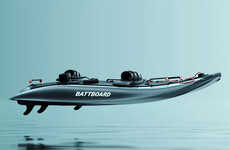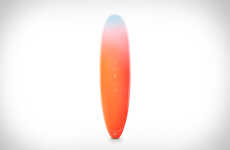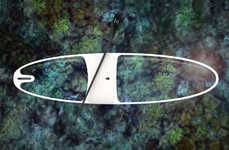
'Varial Infused Glass' Makes for Lighter, Stronger Surfboards
References: varialsurf & digitaltrends
Surfboards haven't changed all that much since shift from wood to resin — indeed some modern boards even make use of wood to this day — but the Varial Infused Glass from the surf technology company of the same name has the potential to shake up the surfing industry. The company's infused glass technique makes for significantly stronger boards that are also lighter than others of the same size.
The technique involves vacuum-bagging Varial's surfboards in a single effort, rather than in stages. This ultimately produces a uniform laminate that has an extremely low amount of resin used in the process, providing a lighter board. The reduced resin is also better for the environment, as it prevents waste.
The technique involves vacuum-bagging Varial's surfboards in a single effort, rather than in stages. This ultimately produces a uniform laminate that has an extremely low amount of resin used in the process, providing a lighter board. The reduced resin is also better for the environment, as it prevents waste.
Trend Themes
1. Infused Glass Technology - The use of infused glass technology in surfboards presents an opportunity for lighter and stronger products in the sports equipment industry.
2. Sustainable Manufacturing - The adoption of reduced resin techniques in surfboard production showcases the potential for more environmentally friendly manufacturing practices across various industries.
3. Lightweight Materials - The development of lighter surfboards through the use of infused glass opens up possibilities for the incorporation of lightweight materials in other recreational equipment sectors.
Industry Implications
1. Sports Equipment - The infusion of glass technology in surfboards suggests disruptive innovation opportunities for creating stronger and lighter sports equipment such as skateboards, snowboards, and bicycles.
2. Manufacturing - The application of reduced resin techniques in surfboard manufacturing highlights potential disruptive innovation in developing more sustainable manufacturing processes across industries like automotive, aerospace, and consumer goods.
3. Recreational Equipment - The use of lightweight materials in surfboard construction offers disruptive innovation potential for the production of lighter and more agile recreational equipment, including camping gear, hiking gear, and water sports equipment.
6.2
Score
Popularity
Activity
Freshness























